新编大学英语第二版第三册第4单元课文翻译
新编大学英语第三册课文原文及翻译
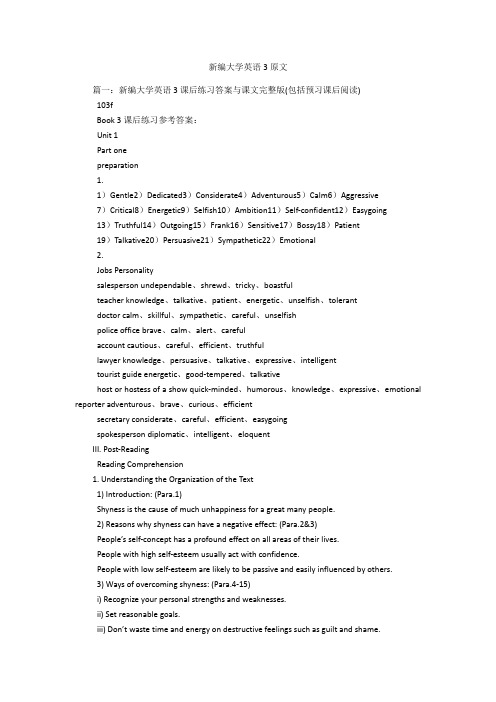
新编大学英语3原文篇一:新编大学英语3课后练习答案与课文完整版(包括预习课后阅读)103fBook 3课后练习参考答案:Unit 1Part onepreparation1.1)Gentle2)Dedicated3)Considerate4)Adventurous5)Calm6)Aggressive7)Critical8)Energetic9)Selfish10)Ambition11)Self-confident12)Easygoing13)Truthful14)Outgoing15)Frank16)Sensitive17)Bossy18)Patient19)Talkative20)Persuasive21)Sympathetic22)Emotional2.Jobs Personalitysalesperson undependable、shrewd、tricky、boastfulteacher knowledge、talkative、patient、energetic、unselfish、tolerantdoctor calm、skillful、sympathetic、careful、unselfishpolice office brave、calm、alert、carefulaccount cautious、careful、efficient、truthfullawyer knowledge、persuasive、talkative、expressive、intelligenttourist guide energetic、good-tempered、talkativehost or hostess of a show quick-minded、humorous、knowledge、expressive、emotional reporter adventurous、brave、curious、efficientsecretary considerate、careful、efficient、easygoingspokesperson diplomatic、intelligent、eloquentIII. Post-ReadingReading Comprehension1. Understanding the Organization of the Text1) Introduction: (Para.1)Shyness is the cause of much unhappiness for a great many people.2) Reasons why shyness can have a negative effect: (Para.2&3)People’s self-concept has a profound effect on all areas of their lives.People with high self-esteem usually act with confidence.People with low self-esteem are likely to be passive and easily influenced by others.3) Ways of overcoming shyness: (Para.4-15)i) Recognize your personal strengths and weaknesses.ii) Set reasonable goals.iii) Don’t waste time and energy on destructive feelings such as guilt and shame.iv) Don’t be afraid to speak up and give your point of view.v) Do not make negative comments about yourself.vi) Accept criticism thoughtfully.vii) Profit from failures and disappointments by viewing them as learning experiences.viii) Do not associate with people who make you feel inadequate.ix) Set aside time to relax, enjoy hobbies, and reevaluate your goals regularly.x) Practice being in social situations.4) Conclusion: (Para.16)The better we understand ourselves, the easier it becomes to live up to our full potential.2. Understanding Specific Information1) F2) F3) T4) T5) T6) F7) T8) F9) F10) T3. Group Discussion1) I think the most effective ways of overcoming shyness are the first and seventh ways. Recognizing our personal strengths and weaknesses is useful because if we know ourselves better, we can feel more self-confident. We can be more objective, instead of being blind. The seventh way is to profit from failures and disappointments as learning experiences. If we allow ourselves to get discouraged and sad when we fail, then we will feel more unsure of ourselves. But if we think of a failure as a learning experience, we are adopting a positive attitude. By analyzing objectively why we failed and planning how to set about doing things differently we will be more likely to succeed next time.2) Modesty is used to describe a reserved appraisal of one’s merits, abilities or success, e.g. she is very modest about her accomplishments. Shyness is used to describe the uncomfortable feeling one has in the company of others. It often implies a lack of self-confidence and a timid, reserved manner. Modesty is a good personality trait while shyness in many cases is undesirable.3) Yes, it is appropriate and normal to be shy in some circumstances: in the presence of teachers, your boss, your parents’ friends or your prospective in-laws; when you are dating someone, especially the first time; when you are with strangers; when you are in a new environment; when you’re facing a large audience.Vocabulary1. Self- is a prefix which means ―of, to or by oneself or itself.‖Words with the prefix self- that appear in the text: self-conscious, self-concept, self-assurance, self-worth, self-confidence, self-esteem, self-destructive, self-awareness, self-accept103fance, self-rejection, self-confident1) self-conscious (worried and embarrassed about what you look like or what other people think of you)2) self-confidence (belief in one’s own ability, power, judgment, etc.; confidence in oneself)3) self-esteem (the feeling that you are someone who deserves to be liked, respected, or4) self-destructive (with thoughts or actions that are counter to one’s own best interests)5) self-worth (the value you give to your life and achievements)6) self-concept (one’s conception or general idea of one’s own basic character and nature)7) self-awareness (realistic knowledge and judgment about oneself)8) self-assurance/self-confidence (the belief that you are able to deal with people and problems easily)2. Part A1) B2) I3) L 4) A5) H6) D7) E8) N9) J10) M11) C12) F13) G14) KPart B1) profound2) jealousy 3) numerous 4) overweight5) overcome6) eventually7) slim 8) compliments 9) diminish10) reassurance 11) detrimental12) isolated13) self-esteem14) accented3. 1) reflected 2) concerned/worried 3) profound effect 4) viewed/regarded 5) sensitive6) respond/react 7) eliminated 8) overcome my fear 9) concentrate on 10) made no commentTranslation1.You should spend a reasonable amount of time relaxing and exercising.2. In general children are healthier and better educated than ever before.3. When the right opportunity comes along, he’ll take it.4. Every day he sets some time aside to be with his family and enjoy life.5. I remember those dark streets and walking hand in hand with my father.6. He finally failed to live up to his parents’ expectations.7. In contrast, our use of oil has increased enormously.8. He succeeded in his efforts to overcome his fatal weakness.Part ThreeFURTHER Development1. 1)BBABC6)CBCAA11)CBPart FourWriting and Translation (P46)2. Translation Practice1) It is believed that pessimism often leads to hopelessness, sickness and failure.2) Optimism, by contrast, can make you happy, healthy and successful.3) When you fail in something, profit from the failure as a learning experience.4) Think about your strengths and build up self-confidence in front of problems or difficulties.5) Don’t let negative thoughts hold you back.6) Everyone has experienced failures and disappointments, so don’t blame yourself too muchPart onepreparation4.matching pictures1)Aphrodite2)Ares3)Hephaestus4)Artemis5)Demeter6)Dionysus7)Poseidon8)Athena9)Apollo10)Hermes11)Hera12)ZeusPost-ReadingReading Comprehension1. 1) Because they were invited to a feast in the sky.2) He saw the birds were busy preparing.3) He planned to go to the feast/sky with the birds.4) They didn’t agree because Tortoise was mischievous/cunning and ungrateful.5) With a sweet tongue, he convinced the birds that he was a changed man.6) He made two wings with all the feathers he got from each bird.7) All of you.8) Nuts, meat and fish soup, pounded yam, yam soup, palm wine, etc.9) For whom have you prepared this feast?10) Because he knew the answer would be ―For all of you‖, which was his new name. So he could enjoy all the food first.11) They were very angry.12) They took back the feathers they had lent him.13) He asked them to take a message to his wife.14) Parrot, because he wanted to take advantage of the chance to get revenge.15) He asked Parrot to tell his wife to bring out all the soft things in his house to cover the ground with them so that he would be able to land safely. But Parrot told his wife to bring out all the hard and sharp, not the soft, things instead.16) His shell was broken into hundreds of pieces.2. Ekwefi is telling a story about Tortoise. Long long ago, there was a famine, and the birds got an invitation from the sky to attend a feast there. Tortoise learned about it and with his sweet tongue he persuaded the birds to take him with them and so each bird lent him a feather.103fTortoise cunningly thought of an idea that enabled him to have all the food by naming himself ―All of you.‖ When they reached the sky, they received a warm welcome and soon the food was presen ted to them. Then he asked one of the people in the sky: ―For whom have you prepared all this feast?‖ The man replied: ―For all of you.‖ So he ate almost all the best food. The birds became very angry and took back their feathers before flying home. Without feathers, he had to jump onto the ground and his shell was broken into pieces.3. Acting out the StorySampleBird A: How exciting! All of us are invited to the feast in the sky.Bird B: I just can’t wait. What do you think I should wear?Tortoise: Hello. Good morning. What are you excited about?Bird A: Didn’t you know that we are going to the sky?Bird B: And we are going to have a big dinner. What fun!Tortoise: How nice it is. What lucky guys. May I go with you? I’m sure we’ll have a lot of fun. Bird A: Yes, we’ll have great fun, but not you. We know you too well. You are full of cunning and you are ungrateful.Bird B: If we allow you to come with us, you will soon begin your mischief.Bird A: We know you of old.Tortoise: You don’t know me now. I’m a changed man. I am not the mischievous man you once knew. In fact, I am thoughtful and well-meaning. I have learned that a man who makes trouble for others is also making trouble for himself. Rest assured, I promise you I will not cause you any trouble.Bird A: (Talking to Bird B) Maybe he is a changed man now. Let’s talk to our bird friends and see if we will take him with us.(After a brief discussion with all the other birds)Bird B: Ok. Tortoise, now we all agreed to take you to the sky. Each of us will lend you a feather so that you can have two wings to fly.(During the flight to the party)Bird A: Tortoise is a great orator!Bird B: Let’s make him the spokesperson for the party.Tortoise: Did you know that we need a new name when we are invited to a great feast like this? It is an age-old custom and our hosts in the sky will expect us to honor it.Bird A: We haven’t heard of this before. But as you are such a learned man, if you say this, we will choose a new name for ourselves. I will call myself Good-Looking.Bird B: I am Smart-Ass.Tortoise: And my new name is All of You.(On their arrival at the sky)Sky people: Welcome to the sky, our dear bird friends. We are so pleased to see you again. Please make yourselves at home.Tortoise: My dear respected friends, thank you so much for inviting us to the sky. Nothing can make us happier than this. It is our greatest honor to be here and have a good time with you. Sky people: Thank you for your nice words. Now please help yourselves to the nuts.Bird A: Tortoise is really eloquent, isn’t he? I’m glad we decided to bring him with us. Bird B: Yes. And these are delicious nuts.Sky people: Now the dinner is ready. Please enjoy the soup, meat, fish and pounded yam. Here is palm wine, too.Tortoise: Just a moment. Let me ask you first. For whom have you prepared this feast? Skypeople: For whom? Why? For all of you, of course.Tortoise (To the birds): You remember that my name is All of You. The custom here is to serve the spokesman first and the others later. They will serve you when I finish.Sky people (To themselves): Looks like it is their custom to leave all the food to their king first. Tortoise: Mm. Yummy. Mm. I’m full now. You can start to eat.Bird A: We should never bring him here. I am too angry to eat. I’m going home.Bird B: Wait. I am leaving, too. Take the feather with us.Tortoise: What are you doing? Leave me the feather. Oh, how am I going home without a single feather? You can’t do this to me?Birds: Bye.Tortoise: Could someone take a message for my wife? Tell her to bring out everything soft and cover the ground. …4. Taking Sides篇二:新编大学英语第三册课文翻译Unit 1羞怯的痛苦对许多人来说,羞怯是很多不愉快的起因。
新编大学英语第二版第三册第4单元课文翻译
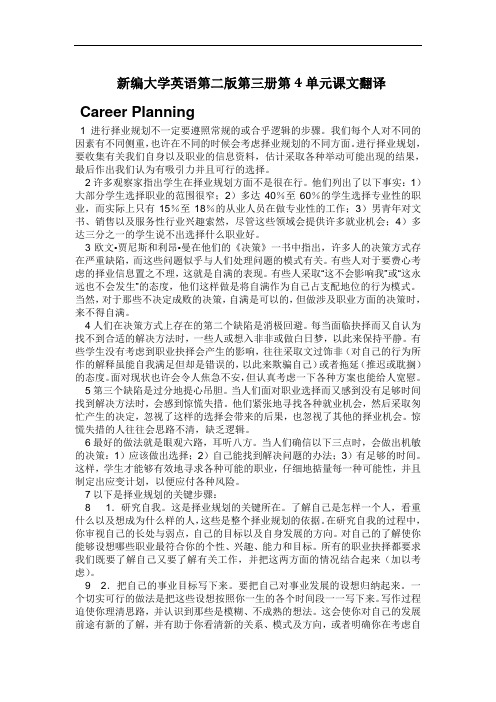
新编大学英语第二版第三册第4单元课文翻译Career Planning1进行择业规划不一定要遵照常规的或合乎逻辑的步骤。
我们每个人对不同的因素有不同侧重,也许在不同的时候会考虑择业规划的不同方面。
进行择业规划,要收集有关我们自身以及职业的信息资料,估计采取各种举动可能出现的结果,最后作出我们认为有吸引力并且可行的选择。
2许多观察家指出学生在择业规划方面不是很在行。
他们列出了以下事实:1)大部分学生选择职业的范围很窄;2)多达40%至60%的学生选择专业性的职业,而实际上只有15%至18%的从业人员在做专业性的工作;3)男青年对文书、销售以及服务性行业兴趣索然,尽管这些领域会提供许多就业机会;4)多达三分之一的学生说不出选择什么职业好。
3欧文•贾尼斯和利昂•曼在他们的《决策》一书中指出,许多人的决策方式存在严重缺陷,而这些问题似乎与人们处理问题的模式有关。
有些人对于要费心考虑的择业信息置之不理,这就是自满的表现。
有些人采取“这不会影响我”或“这永远也不会发生”的态度,他们这样做是将自满作为自己占支配地位的行为模式。
当然,对于那些不决定成败的决策,自满是可以的,但做涉及职业方面的决策时,来不得自满。
4人们在决策方式上存在的第二个缺陷是消极回避。
每当面临抉择而又自认为找不到合适的解决方法时,一些人或想入非非或做白日梦,以此来保持平静。
有些学生没有考虑到职业抉择会产生的影响,往往采取文过饰非(对自己的行为所作的解释虽能自我满足但却是错误的,以此来欺骗自己)或者拖延(推迟或耽搁)的态度。
面对现状也许会令人焦急不安,但认真考虑一下各种方案也能给人宽慰。
5第三个缺陷是过分地提心吊胆。
当人们面对职业选择而又感到没有足够时间找到解决方法时,会感到惊慌失措。
他们紧张地寻找各种就业机会,然后采取匆忙产生的决定,忽视了这样的选择会带来的后果,也忽视了其他的择业机会。
惊慌失措的人往往会思路不清,缺乏逻辑。
6最好的做法就是眼观六路,耳听八方。
Unit 4 Psychology in Our Daily Life新编大学英语第二版第二册课文翻译
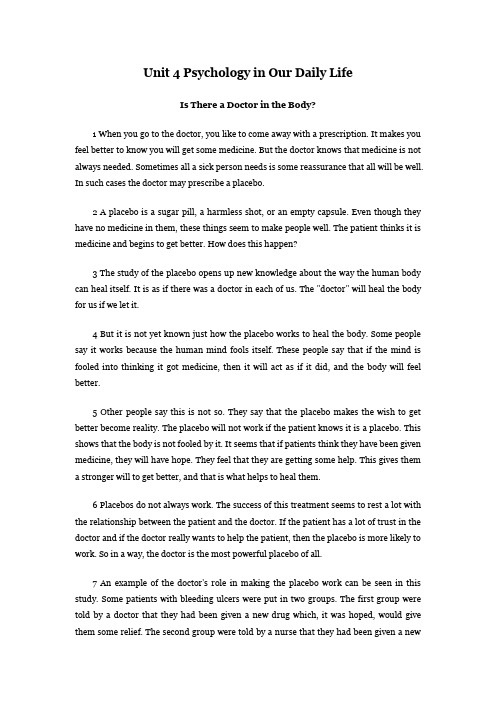
Unit 4 Psychology in Our Daily LifeIs There a Doctor in the Body?1 When you go to the doctor, you like to come away with a prescription. It makes you feel better to know you will get some medicine. But the doctor knows that medicine is not always needed. Sometimes all a sick person needs is some reassurance that all will be well. In such cases the doctor may prescribe a placebo.2 A placebo is a sugar pill, a harmless shot, or an empty capsule. Even though they have no medicine in them, these things seem to make people well. The patient thinks it is medicine and begins to get better. How does this happen?3 The study of the placebo opens up new knowledge about the way the human body can heal itself. It is as if there was a doctor in each of us. The "doctor" will heal the body for us if we let it.4 But it is not yet known just how the placebo works to heal the body. Some people say it works because the human mind fools itself. These people say that if the mind is fooled into thinking it got medicine, then it will act as if it did, and the body will feel better.5 Other people say this is not so. They say that the placebo makes the wish to get better become reality. The placebo will not work if the patient knows it is a placebo. This shows that the body is not fooled by it. It seems that if patients think they have been given medicine, they will have hope. They feel that they are getting some help. This gives them a stronger will to get better, and that is what helps to heal them.6 Placebos do not always work. The success of this treatment seems to rest a lot with the relationship between the patient and the doctor. If the patient has a lot of trust in the doctor and if the doctor really wants to help the patient, then the placebo is more likely to work. So in a way, the doctor is the most powerful placebo of all.7 An example of the doctor's role in making the placebo work can be seen in this study. Some patients with bleeding ulcers were put in two groups. The first group were told by a doctor that they had been given a new drug which, it was hoped, would give them some relief. The second group were told by a nurse that they had been given a newdrug but that not much was known about how it would work. As a result, 70 percent of the people in the first group got much better. Only 25 percent of the people in the second group got better. And both groups had in fact been given the same thing a placebo.8 The placebo has been found to work with a lot of different cases. It helps such things as seasickness, coughs, colds, and even pain after an operation. And there was an experiment done to see if a placebo could help old people stay healthy and live longer.9 The test was done in Romania with 150 people over the age of 60. They were put in three groups with 50 people in each group. The first group were given nothing at all. The second group were given a placebo. The third group were given a real drug and told that it would help with the problems of old age. (In fact, it was not a drug for old age at all.) The three groups were studied for many years. The first group showed no changes from the way old people in that village had always been. The second group (with the placebo) had much better health and a lower death rate. The third group (with the real drug) showed much the same results as the group that took the placebo.10 A placebo can also have bad effects. If patients expect a bad reaction to medicine, then they will also show a bad reaction to the placebo. This would seem to show that a lot of how you react to medicine is in your mind rather than in your body. Some doctors still think that if the placebo can have bad effects it should never be used. They think there is still not enough known about it.11 And yet, the use of the placebo has been well known for hundreds of years in other countries. Tribal doctors in some African countries have known for a long time that patients will get better if they think they are going to. Many of the "treatments" they use do not seem able to make a sick person better, and yet such treatments work.12 The strange power of the placebo does seem to suggest that the human mind is stronger than we think it is. There are people who say you can heal your body by using your mind. And the interesting thing is that even people who swear this is not possible have been healed by a placebo.人体内有医生吗?1 当你去看病时,你总希望走时能拿到一张药方。
Unit-4-Psychology-in-Our-Daily-Life新编大学英语第二版第二册课文翻译
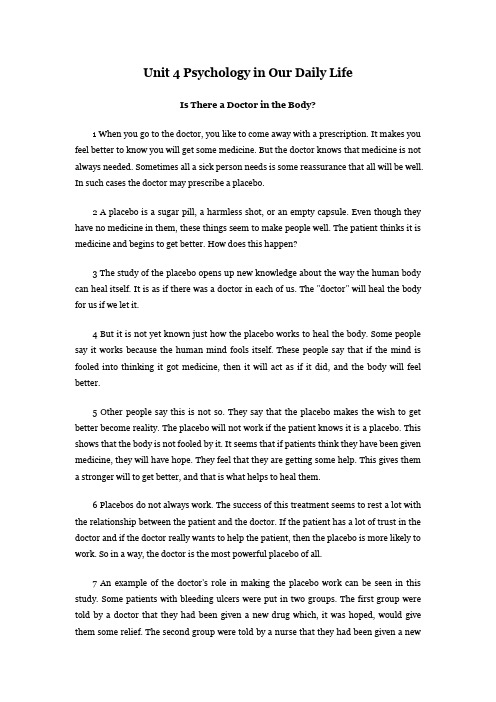
Unit 4 Psychology in Our Daily LifeIs There a Doctor in the Body?1 When you go to the doctor, you like to come away with a prescription. It makes you feel better to know you will get some medicine. But the doctor knows that medicine is not always needed. Sometimes all a sick person needs is some reassurance that all will be well. In such cases the doctor may prescribe a placebo.2 A placebo is a sugar pill, a harmless shot, or an empty capsule. Even though they have no medicine in them, these things seem to make people well. The patient thinks it is medicine and begins to get better. How does this happen?3 The study of the placebo opens up new knowledge about the way the human body can heal itself. It is as if there was a doctor in each of us. The "doctor" will heal the body for us if we let it.4 But it is not yet known just how the placebo works to heal the body. Some people say it works because the human mind fools itself. These people say that if the mind is fooled into thinking it got medicine, then it will act as if it did, and the body will feel better.5 Other people say this is not so. They say that the placebo makes the wish to get better become reality. The placebo will not work if the patient knows it is a placebo. This shows that the body is not fooled by it. It seems that if patients think they have been given medicine, they will have hope. They feel that they are getting some help. This gives them a stronger will to get better, and that is what helps to heal them.6 Placebos do not always work. The success of this treatment seems to rest a lot with the relationship between the patient and the doctor. If the patient has a lot of trust in the doctor and if the doctor really wants to help the patient, then the placebo is more likely to work. So in a way, the doctor is the most powerful placebo of all.7 An example of the doctor's role in making the placebo work can be seen in this study. Some patients with bleeding ulcers were put in two groups. The first group were told by a doctor that they had been given a new drug which, it was hoped, would give them some relief. The second group were told by a nurse that they had been given a newdrug but that not much was known about how it would work. As a result, 70 percent of the people in the first group got much better. Only 25 percent of the people in the second group got better. And both groups had in fact been given the same thing a placebo.8 The placebo has been found to work with a lot of different cases. It helps such things as seasickness, coughs, colds, and even pain after an operation. And there was an experiment done to see if a placebo could help old people stay healthy and live longer.9 The test was done in Romania with 150 people over the age of 60. They were put in three groups with 50 people in each group. The first group were given nothing at all. The second group were given a placebo. The third group were given a real drug and told that it would help with the problems of old age. (In fact, it was not a drug for old age at all.) The three groups were studied for many years. The first group showed no changes from the way old people in that village had always been. The second group (with the placebo) had much better health and a lower death rate. The third group (with the real drug) showed much the same results as the group that took the placebo.10 A placebo can also have bad effects. If patients expect a bad reaction to medicine, then they will also show a bad reaction to the placebo. This would seem to show that a lot of how you react to medicine is in your mind rather than in your body. Some doctors still think that if the placebo can have bad effects it should never be used. They think there is still not enough known about it.11 And yet, the use of the placebo has been well known for hundreds of years in other countries. Tribal doctors in some African countries have known for a long time that patients will get better if they think they are going to. Many of the "treatments" they use do not seem able to make a sick person better, and yet such treatments work.12 The strange power of the placebo does seem to suggest that the human mind is stronger than we think it is. There are people who say you can heal your body by using your mind. And the interesting thing is that even people who swear this is not possible have been healed by a placebo.人体内有医生吗?1 当你去看病时,你总希望走时能拿到一张药方。
新编大学英语4(第二版)课文翻译及课后答案详解
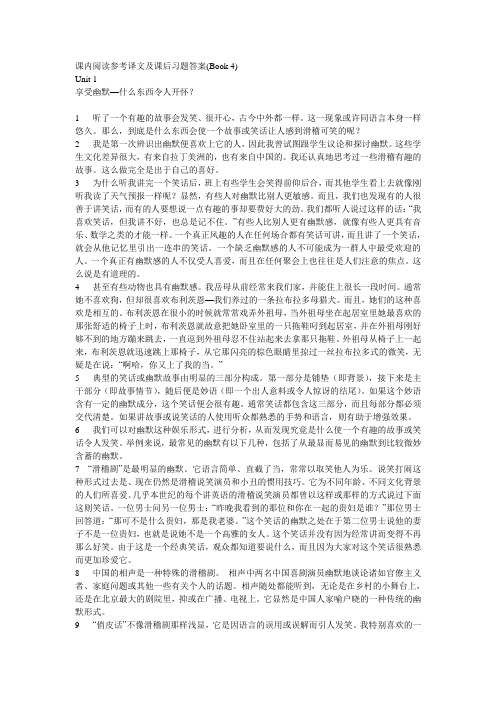
课内阅读参考译文及课后习题答案(Book 4)Unit 1享受幽默—什么东西令人开怀?1 听了一个有趣的故事会发笑、很开心,古今中外都一样。
这一现象或许同语言本身一样悠久。
那么,到底是什么东西会使一个故事或笑话让人感到滑稽可笑的呢?2 我是第一次辨识出幽默便喜欢上它的人,因此我曾试图跟学生议论和探讨幽默。
这些学生文化差异很大,有来自拉丁美洲的,也有来自中国的。
我还认真地思考过一些滑稽有趣的故事。
这么做完全是出于自己的喜好。
3 为什么听我讲完一个笑话后,班上有些学生会笑得前仰后合,而其他学生看上去就像刚听我读了天气预报一样呢?显然,有些人对幽默比别人更敏感。
而且,我们也发现有的人很善于讲笑话,而有的人要想说一点有趣的事却要费好大的劲。
我们都听人说过这样的话:―我喜欢笑话,但我讲不好,也总是记不住。
‖有些人比别人更有幽默感,就像有些人更具有音乐、数学之类的才能一样。
一个真正风趣的人在任何场合都有笑话可讲,而且讲了一个笑话,就会从他记忆里引出一连串的笑话。
一个缺乏幽默感的人不可能成为一群人中最受欢迎的人。
一个真正有幽默感的人不仅受人喜爱,而且在任何聚会上也往往是人们注意的焦点。
这么说是有道理的。
4 甚至有些动物也具有幽默感。
我岳母从前经常来我们家,并能住上很长一段时间。
通常她不喜欢狗,但却很喜欢布利茨恩—我们养过的一条拉布拉多母猎犬。
而且,她们的这种喜欢是相互的。
布利茨恩在很小的时候就常常戏弄外祖母,当外祖母坐在起居室里她最喜欢的那张舒适的椅子上时,布利茨恩就故意把她卧室里的一只拖鞋叼到起居室,并在外祖母刚好够不到的地方蹦来跳去,一直逗到外祖母忍不住站起来去拿那只拖鞋。
外祖母从椅子上一起来,布利茨恩就迅速跳上那椅子,从它那闪亮的棕色眼睛里掠过一丝拉布拉多式的微笑,无疑是在说:―啊哈,你又上了我的当。
‖5 典型的笑话或幽默故事由明显的三部分构成。
第一部分是铺垫(即背景),接下来是主干部分(即故事情节),随后便是妙语(即一个出人意料或令人惊讶的结尾)。
新编大学英语(第二版)第三册汉译英翻译
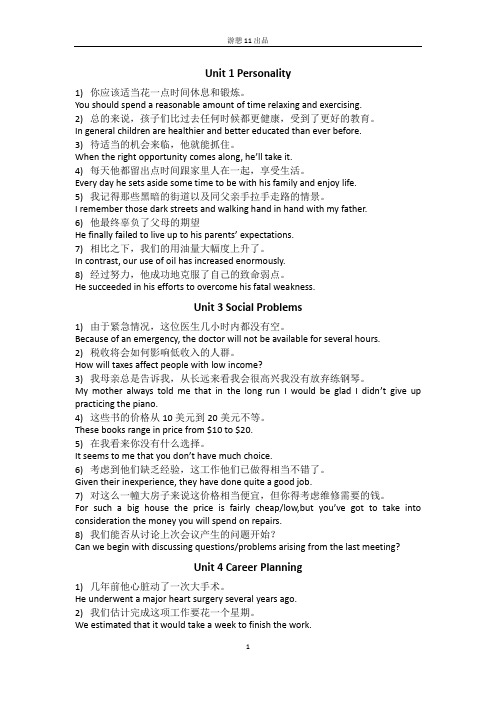
Unit 1 Personality1)你应该适当花一点时间休息和锻炼。
You should spend a reasonable amount of time relaxing and exercising.2)总的来说,孩子们比过去任何时候都更健康,受到了更好的教育。
In general children are healthier and better educated than ever before.3)待适当的机会来临,他就能抓住。
When the right opportunity comes along, he’ll take it.4)每天他都留出点时间跟家里人在一起,享受生活。
Every day he sets aside some time to be with his family and enjoy life.5)我记得那些黑暗的街道以及同父亲手拉手走路的情景。
I remember those dark streets and walking hand in hand with my father.6)他最终辜负了父母的期望He finally failed to live up to his parents’ expectations.7)相比之下,我们的用油量大幅度上升了。
In contrast, our use of oil has increased enormously.8)经过努力,他成功地克服了自己的致命弱点。
He succeeded in his efforts to overcome his fatal weakness.Unit 3 Social Problems1)由于紧急情况,这位医生几小时内都没有空。
Because of an emergency, the doctor will not be available for several hours.2)税收将会如何影响低收入的人群。
新编大学英语第二版第2册课文翻译
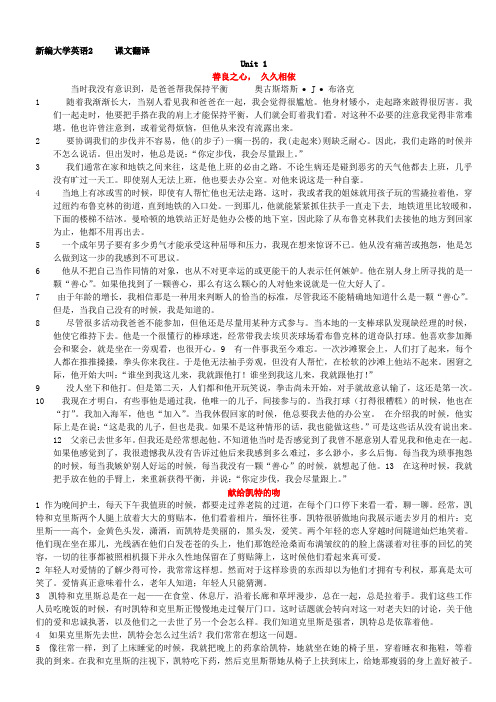
新编大学英语2 课文翻译Unit 1善良之心,久久相依当时我没有意识到,是爸爸帮我保持平衡奥古斯塔斯∙ J ∙布洛克1随着我渐渐长大,当别人看见我和爸爸在一起,我会觉得很尴尬。
他身材矮小,走起路来跛得很厉害。
我们一起走时,他要把手搭在我的肩上才能保持平衡,人们就会盯着我们看。
对这种不必要的注意我觉得非常难堪。
他也许曾注意到,或着觉得烦恼,但他从来没有流露出来。
2要协调我们的步伐并不容易,他(的步子)一瘸一拐的,我(走起来)则缺乏耐心。
因此,我们走路的时候并不怎么说话。
但出发时,他总是说:“你定步伐,我会尽量跟上。
”3我们通常在家和地铁之间来往,这是他上班的必由之路。
不论生病还是碰到恶劣的天气他都去上班,几乎没有旷过一天工。
即使别人无法上班,他也要去办公室。
对他来说这是一种自豪。
4当地上有冰或雪的时候,即使有人帮忙他也无法走路。
这时,我或者我的姐妹就用孩子玩的雪撬拉着他,穿过纽约布鲁克林的街道,直到地铁的入口处。
一到那儿,他就能紧紧抓住扶手一直走下去, 地铁道里比较暖和,下面的楼梯不结冰。
曼哈顿的地铁站正好是他办公楼的地下室,因此除了从布鲁克林我们去接他的地方到回家为止,他都不用再出去。
5一个成年男子要有多少勇气才能承受这种屈辱和压力,我现在想来惊讶不已。
他从没有痛苦或抱怨,他是怎么做到这一步的我感到不可思议。
6他从不把自己当作同情的对象,也从不对更幸运的或更能干的人表示任何嫉妒。
他在别人身上所寻找的是一颗“善心”。
如果他找到了一颗善心,那么有这么颗心的人对他来说就是一位大好人了。
7由于年龄的增长,我相信那是一种用来判断人的恰当的标准,尽管我还不能精确地知道什么是一颗“善心”。
但是,当我自己没有的时候,我是知道的。
8尽管很多活动我爸爸不能参加,但他还是尽量用某种方式参与。
当本地的一支棒球队发现缺经理的时候,他使它维持下去。
他是一个很懂行的棒球迷,经常带我去埃贝茨球场看布鲁克林的道奇队打球。
他喜欢参加舞会和聚会,就是坐在一旁观看,也很开心。
Unit 4 Creativity新编大学英语第二版第四册课文翻译

Unit 4 CreativityThe Case for Creativity—Encouraging Children to ThinkCreativity is the key to a brighter future, say education and business experts. Here is how schools and parents can encourage this vital skill in children.If Dick Drew had listened to his boss in 1925, we might not have a product that we now think of as practically essential: masking tape. Drew worked for the Minnesota Manufacturing and Mining Company, better known as 3M. At work he developed a sticky-side substance strong enough to hold things together. But his boss told him not to pursue the idea. Finally, using his own time, Drew perfected the tape, which now is used everywhere by many people. And his former company learned from its mistake: Now 3M encourages people to spend 15 percent of their work time just thinking and developing new ideas.It is a strategy that more and more companies are employing and one that experts around the country say we ought to be following with our children, both at home and at school. The feeling is that if we teach them to think creatively, they will be better able to function in tomorrow's society.Creativity's benefits reach beyond music and art. Successful students and adults are the ones who discover a number of ways to approach problems.Creativity is not something one is just born with, nor is it necessarily a characteristic of high intelligence. Just because a person is highly intelligent does not mean that he uses it creatively. Creativity is the matter of using the resources one has to produce original ideas that are good for something.Unfortunately, schools have not tended to promote creativity. With strong emphasis on test scores and the development of reading, writing and mathematical skills, many educators sacrifice creativity for correct answers. The result is that children can give back information but can't recognize ways to apply it to new situations. They may know their multiplication tables, for example, but they are unable to apply them to story problems.In some schools, however, educators are recognizing the problem and are developing new approaches to teaching which should encourage creativity in their students. Some teachers are combining the basics with activities where the students must use their imagination. For example, instead of simply asking WHEN Columbus discovered the New World, teachers might ask students to think about what would have happened if his trip had taken him to New York first instead of to the Caribbean area. With that question, students would have to use what they know about Columbus, what they know about NewYork, and what they know about the Caribbean. Teachers feel that even if the answers seem silly, it's OK, that sometimes being silly is an essential step toward creativity. In the classroom as well as at home, children must have the right to have crazy thoughts, experts say. Then it is up to parents and teachers to work with the children to develop those thoughts into workable ideas. The best strategy is to encourage children by asking them questions, meanwhile praising their ideas and new thoughts. Experts say that it is important to create an atmosphere in which there is no risk in being creative—a place where wild ideas are honored and valued, never scorned or dismissed.There are things that parents can do at home to encourage creativity. They can involve children in decision-making if the problem is appropriate, asking the child for suggestions. Parents can help their children to understand the consequences of various decisions. Parents should also encourage their children to talk out loud about things they are doing. Thinking and language skills are closely related. Talking out loud improves language skills and thinking skills.Having a sense of humor is also important in helping to develop creativity in a child. When parents show a sense of humor, children can see creativity in its purest form. By its nature, humor crosses conventional boundaries and breaks patterns. Creativity often does the same.It is important to give children choices. From the earliest age, children should be allowed to make decisions and understand their consequences. Even if it's choosing between two food items for lunch, decision-making helps thinking skills. As children grow older, parents should let their children decide how to use their time or spend their money, but not automatically help them too much if they make the wrong decision. This may be confusing for the child, but that is all right. This is because one of the most important traits of creative people is a very strong motivation to make order out of confusion.关于创造力的培养——鼓励孩子思考1 教育界和商业界的专家们说, 具有创造性是通向光明前程的关键。
- 1、下载文档前请自行甄别文档内容的完整性,平台不提供额外的编辑、内容补充、找答案等附加服务。
- 2、"仅部分预览"的文档,不可在线预览部分如存在完整性等问题,可反馈申请退款(可完整预览的文档不适用该条件!)。
- 3、如文档侵犯您的权益,请联系客服反馈,我们会尽快为您处理(人工客服工作时间:9:00-18:30)。
新编大学英语第二版第三册第4单元课文翻译Career Planning1进行择业规划不一定要遵照常规的或合乎逻辑的步骤。
我们每个人对不同的因素有不同侧重,也许在不同的时候会考虑择业规划的不同方面。
进行择业规划,要收集有关我们自身以及职业的信息资料,估计采取各种举动可能出现的结果,最后作出我们认为有吸引力并且可行的选择。
2许多观察家指出学生在择业规划方面不是很在行。
他们列出了以下事实:1)大部分学生选择职业的范围很窄;2)多达40%至60%的学生选择专业性的职业,而实际上只有15%至18%的从业人员在做专业性的工作;3)男青年对文书、销售以及服务性行业兴趣索然,尽管这些领域会提供许多就业机会;4)多达三分之一的学生说不出选择什么职业好。
3欧文•贾尼斯和利昂•曼在他们的《决策》一书中指出,许多人的决策方式存在严重缺陷,而这些问题似乎与人们处理问题的模式有关。
有些人对于要费心考虑的择业信息置之不理,这就是自满的表现。
有些人采取“这不会影响我”或“这永远也不会发生”的态度,他们这样做是将自满作为自己占支配地位的行为模式。
当然,对于那些不决定成败的决策,自满是可以的,但做涉及职业方面的决策时,来不得自满。
4人们在决策方式上存在的第二个缺陷是消极回避。
每当面临抉择而又自认为找不到合适的解决方法时,一些人或想入非非或做白日梦,以此来保持平静。
有些学生没有考虑到职业抉择会产生的影响,往往采取文过饰非(对自己的行为所作的解释虽能自我满足但却是错误的,以此来欺骗自己)或者拖延(推迟或耽搁)的态度。
面对现状也许会令人焦急不安,但认真考虑一下各种方案也能给人宽慰。
5第三个缺陷是过分地提心吊胆。
当人们面对职业选择而又感到没有足够时间找到解决方法时,会感到惊慌失措。
他们紧张地寻找各种就业机会,然后采取匆忙产生的决定,忽视了这样的选择会带来的后果,也忽视了其他的择业机会。
惊慌失措的人往往会思路不清,缺乏逻辑。
6最好的做法就是眼观六路,耳听八方。
当人们确信以下三点时,会做出机敏的决策:1)应该做出选择;2)自己能找到解决问题的办法;3)有足够的时间。
这样,学生才能够有效地寻求各种可能的职业,仔细地掂量每一种可能性,并且制定出应变计划,以便应付各种风险。
7以下是择业规划的关键步骤:8 1.研究自我。
这是择业规划的关键所在。
了解自己是怎样一个人,看重什么以及想成为什么样的人,这些是整个择业规划的依据。
在研究自我的过程中,你审视自己的长处与弱点,自己的目标以及自身发展的方向。
对自己的了解使你能够设想哪些职业最符合你的个性、兴趣、能力和目标。
所有的职业抉择都要求我们既要了解自己又要了解有关工作,并把这两方面的情况结合起来(加以考虑)。
9 2.把自己的事业目标写下来。
要把自己对事业发展的设想归纳起来。
一个切实可行的做法是把这些设想按照你一生的各个时间段一一写下来。
写作过程迫使你理清思路,并认识到那些是模糊、不成熟的想法。
这会使你对自己的发展前途有新的了解,并有助于你看清新的关系、模式及方向,或者明确你在考虑自己事业发展方面还有哪些不到之处。
10 3.定期与他人一起检查你的规划与所取得的进展。
有时候要估量一下自己的情形,考虑下一步该采取什么步骤。
评估一下自己的进步并计划下面的步骤,这有助于你应对自己要经历的变化以及劳动力市场的变化。
与你的大学辅导员、父母与朋友探讨你的计划,这有助于你明确目标,改进择业规划,或使计划得以实施。
11 4.如果你选择的职业不适合你,你可以重新开始。
如今,越来越多的男男女女在变换职业,或者重新开始一份对他们更有吸引力的职业。
其中许多人一旦发现自己所从事的行业不尽如人意,就重新参加培训以谋求其他职业。
这些新的职业常常是他们年轻时所忽视的,或者是由于当时的经济或别的原因而没有机会从事的。
12 社会学家们说几乎没有什么职业的变换是“走下坡路”的,大部分都是按传统的关注“往高处走”的。
社会已不再像过去那样把跳槽看成是一种“不安分”、可耻的事了。
13换工作和改职业在任何年龄都会发生。
据估计, 20岁到25岁这个年龄段的男性中多达四分之一的人更换职业。
而在25岁到44岁的年龄段,该比例大约是八分之一。
14 择业规划并不能保证你将来所面临的所有问题、困难或决策形势都能得到解决或变得容易。
没有任何妙方能做到这一点。
但是,择业规划能够帮助你面对或更好地处理新的问题,诸如决定是否要接受某方面的教育或培训,是否要更换工作,还能帮助你分析所面临的困境或与某人交往中所存在的困难。
15 没有人能预见我们任何一个人的未来。
未来的一些社会、情感、道德等方面要考虑的因素是无法预见的。
但是这个往往不尽如人意的现代世界给予了我们一个最重要的教训,那就是进步来自于规划。
对自己职业的无知并不是一种福气,理智比机遇和命运更重要。
Summer Job Planning1假设你知道自己大学毕业后想干什么(现今,如果进了大学你还没选中一种职业,也许会被看成目光短浅),你早在毕业前就应该考虑找一份工作了。
2 哪些公司或机构会有你想要的工作呢? 假定你的专业是英文或历史,你想要写一部了不起的小说,那么你需要一份工作来支付生活和教育费用。
你必须从一系列的可能性中进行选择,就像你从个人电脑屏幕的“菜单”中挑一个选项一样。
你可能有下列选项:A.到一家出版公司工作B.给一家科技公司当笔杆子C.到一家公关公司工作D.读研究生,先不做决定E.其他3 假如你选中A,有一个好主意,就是在大学期间就向十几家出版社写信,请求与人事主管面谈。
假如你碰巧有个熟人是编辑,而他愿意见你,那样的话敢情更好。
4.要想方设法争取面试机会。
在面试前你应该熟悉这家公司,而面试的目的是向人事经理表达自己在这家公司工作的兴趣。
你可以打听是否能做暑期工(可能的话,要有酬劳)或实习生。
在很多情况下实习生有少量薪水,但也有无报酬的情况。
5 在人生的这一阶段,找一个能促进未来事业的暑期工作很重要。
如果在自己的专业领域找不到工作,那么你可以选另一类暑期工作——救生员、房屋油漆工、园林工、女招待、或者零售店或超市的工作人员。
这些工作通常薪酬优厚,你可以存下足够的钱应付大学里的很多开销。
但这些工作可能无助于你的择业规划,你必须在这两个方面权衡一下。
任何一个需要你付出艰苦努力以及要求有一定责任心的暑期工作,写在你的简历上都是好的。
要是这份工作与将来的事业相关,你的简历看起来自然就更吸引人。
6 有一天,在上下班乘坐的火车上,我坐在两位女中学生的前面。
其中一个女孩对另一个说:“我上大学不会花我父亲一分钱。
至少我觉得不会。
”她解释说,周末、暑假、圣诞节和春假她都在一家餐馆当服务员。
她的小费很可观,她已存下了一万美元。
她计划上拉特格斯大学,住在家里走读。
如果她在大学期间继续打工,她估计不用借债就能毕业并上研究生院。
7 我在大学期间开始寻找暑期工作的时候,我发现除餐馆外唯一愿意雇我的单位是法林百货公司——波士顿的一家大百货公司,它在科德角开了家夏季分店,我的家人就在那儿度假。
我在大学一年级时,去过马萨诸塞州北安普敦的分店,是全年营业的。
我申请在周六以及接下来的暑假当售货员,当场就被录用了。
那年夏天,北安普敦分店的经理负责管理科德角分店的夏季营业,她要我过去做营业员。
8 大学期间,我都为法林公司在科德角的分店工作,包括暑期、学期当中的周六和大减价时,赚取了我整个大学期间的生活支出。
冬季法林公司在我校校报上刊登广告,我为其构思编写广告词,一位绘画专业的学生按我的设想配图。
当我读到大四的时候,我知道自己不想从事零售业,但它是我未来谋生的应急手段。
我在与商店经理的谈话中了解到,如果我找不到报刊记者的工作,我可以在法林公司培训小组得到一个职位,并以此为跳板从事写作。
Which Career Is the Right One for You?1 你在努力规划自己事业的时候,要尝试各种职业,在各种不同环境中工作并主动承担不同的任务。
2 职业基本上分为六大类。
约翰斯·霍普金斯大学心理学教授约翰·L·霍兰德列出了这六类职业,下面我将它们较为详细地描述一下。
当我谈到从事这些职业的人员的特点时,请注意,没有哪个人会具备所有这些特性。
我谈的是倾向性的特点,但都是很明显的倾向。
第一类——现实型职业3主要是手艺或技术性职业,通常需要使用工具或机器,常常被称为“蓝领”职务。
4 喜爱现实性职业的人往往身体结实、讲求实际、身强体壮、常常怀有积极的人生观。
他们通常具有良好的身体协调性,但有时候在自我表达或与他人交谈方面有困难。
他们宁愿与物体而不愿与观念或人打交道。
他们喜爱动手搞发明创造。
尽管他们的肌肉协调性很好,但在社交场合经常感到不自在,缺乏语言和人际交往技能。
他们通常认为自己擅长机械操作和体育运动,他们个性稳定、不做作、执着。
他们往往重具体、轻抽象。
注重现实的人倾向于用简单、明确和传统的眼光看世界。
财富对他们很重要,而他们的休闲消费通常用于汽车、船、摩托车或其他机械装置。
5 注重现实的人在接受采访时将自己描述为“循规蹈矩、直率、真诚、普通、执着、实际、稳定、节俭、唯物和腼腆”。
6 总体而言,在现实性职业中,既没有个人或机构之间错综复杂的矛盾, 也不必在相互冲突的人生哲学之间进行艰难的抉择,生活没有被复杂化。
第二类——传统型职业7 这些通常是办公室工作,处理的是机构事务、档案资料和常规日程。
8 传统性职业包括簿记员、统计员、银行出纳员、秘书、财务分析员、办公室主任、电脑操作员、银行财务主管和会计。
传统性职业通常需要做一定的笔头工作,但一般都是撰写商务信函和常规报告。
9 喜欢从事传统性职业的人把自己描述成“循规蹈矩、负责、高效、服从、有条理、执着、现实、冷静”。
10 他们喜欢生活井井有条,喜欢按计划行事。
他们喜欢了解别人对他们的期望,并乐于完成指派给自己的任务。
第三类——研究型职业11 这些是科研和实验室工作,人们由此探究世界是如何构成的。
12 研究型工作的本质是科学或实验室研究,而且通常涉及试图解决难题,大到“宇宙是如何产生的”这类难解之谜,小到搞清楚诊所中一位病人的血样的成分这类普通的日常问题。
13 研究人员通常在实验室或医院里工作,但他们也在许多其他地方工作——在公路部门中研究交通控制以及筑路材料的成分之类的课题;在广告公司进行市场调查;在食品公司研究食品营养;在军事部门研究新式武器和新的军事战略在财政部门研究经济策略和货币流通等问题——总而言之,他们工作在用系统的、科学的方法攻克难题的任何地方。
14 他们把自己描述为“分析性强、好奇心重、独立自主和沉默寡言”。
他们特别不喜欢重复性的活动和销售活动。
他们具有很强的求知欲.第四类——艺术型职业15这些职业是人们用语言、音乐或美术进行的创造性工作。
